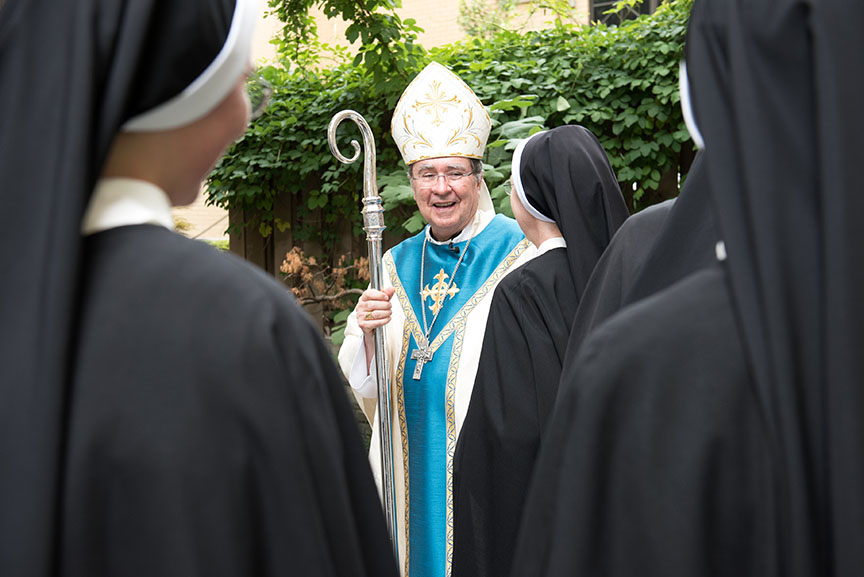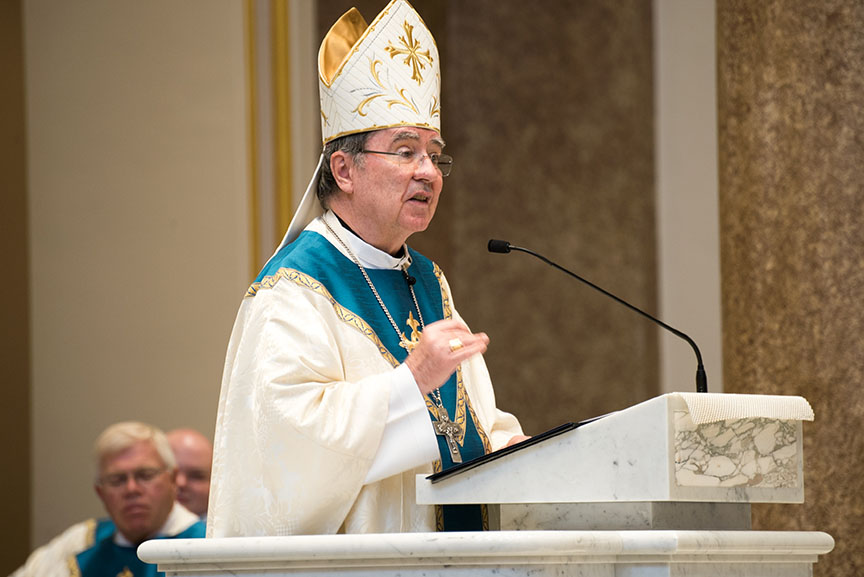
“You have to be the light of the world today. This is what I think Pope Francis wants us to be.”
Thus were the thoughts of Archbishop Christophe Pierre, Apostolic Nuncio of the United States of America, upon reflection of three of the largest conversations in the Church – the Synod on Synodality, the Eucharistic Revival and the recent U.S. Supreme Court’s decision in Dobbs v. Jackson Women’s Health Organization, which reversed the precedent set in the 1973 ruling in Roe v. Wade declaring a woman’s constitutional right to an abortion.
Archbishop Pierre recently visited the Diocese of Nashville to celebrate the Mass for the Rite of Perpetual Religious Profession for eight sisters of the Dominican Sisters of Saint Cecilia Congregation Monday, July 25, at the Cathedral of the Incarnation. Archbishop Pierre was appointed Apostolic Nuncio of the United States of America by Pope Francis on April 12, 2016. Prior to that appointment, he served as Apostolic Nuncio to Haiti, Uganda and Mexico. An apostolic nuncio is an ecclesiastical diplomat, serving as an envoy or a permanent diplomatic representative of the Holy See to a state or to an international organization.
Archbishop Pierre sat down with Tennessee Register reporter Katie Peterson following the Mass to offer his thoughts on those three issues of the Church, and in the case of all three, Archbishop Pierre said it’s about coming together as a Church and being the Body of Christ.
“We are living in a time of difficulties because of synchronizations, because of fragmentation of society, so the Church has to be a Church in today’s world, not yesterday,” he said. “Many people dream about the past, but we cannot exist in the past. Jesus is incarnate into the human reality today.
“You have to be the light of the world today. This is what I think Pope Francis wants us to be,” he said. “It doesn’t mean that he’s changing the doctrine of the faith. The story is the same, precisely, the Gospel is the Good News, when he tells us to rediscover who we are and where we are going.”
Synod on Synodality
The Synod on Synodality, a two-year process that launched in October 2021, was an initiative begun by Pope Francis “to provide an opportunity for the entire People of God to discern together how to move forward on the path towards being a more synodal Church in the long-term,” according to the official Synod website.
The two-year process recently finished its diocesan phase after dioceses all around the world conducted listening sessions to hear the ideas and concerns of the people of the Church. Appointed facilitators of each diocese have been preparing a synthesis of the discussions to be forwarded to the U.S. Conference of Catholic Bishops, which has asked the archdioceses and dioceses in each of the country’s 15 regions, to combine their reports into a single synthesis.
The process will eventually culminate with the Synod of Bishops in October 2023, but Archbishop Pierre said that’s not where the Holy Father intends for it to end.
“The pope wants to put the Church in a kind of synodal mentality, which should be the way of the Church,” Archbishop Pierre said. “We are to work together.
“The synodal has always been the way of the Church, so why is the pope asking us to do this now?” he continued. “We live in a time where … there is a lack of communication and education, especially in the communication of the faith. … To communicate, we need to be connected and work together.”
Archbishop Pierre noted three key points in Pope Francis’ homily when he first launched the synodality process, which sums up the idea of the synod. The first is to encounter each other.
“We must organize true encounters between one another. This is needed today, even in families,” Archbishop Pierre said. “There is a process now of individualism, of synchronization, of isolation of people. The parents do not speak to the children and the children are informed of their own future not by the parents but other sources.”
The second is listening to one another once the encounter has been made.
“The listening process is not just the necessity to listen. … There is another dimension, which we have forgotten as a Church,” Archbishop Pierre said. “We need to listen to the Holy Spirit living in the Church and this is a process which needs prayer and attention.”
The third is “we listen to one another and together we try to discern where to go,” he continued. “And the purpose is to be evangelized. … For that, we need … strong leadership. This is what synodality is all about.”
That’s what the formal process of the Synod is for, he said, as it becomes “a new step in the life of the Church, but we have to continue it. It should be a custom in the Church.”
The Eucharistic Revival
The Eucharistic Revival, which launched on the Feast of Corpus Christi, is an initiative begun by the U.S. Conference of Catholic Bishops after a Pew study done in late 2019 revealed that only 30 percent of Catholics believe in the Real Presence of Christ in the Eucharist.
“This stark reality inspired the bishops of the United States to action,” according to the official Eucharistic Revival website. “More than an event or a program, they envisioned a true revival to rediscover the source and summit of our faith through a deep commitment of prayer, pilgrimage and worship on the part of the entire Church in the United States.”

Archbishop Pierre said the revival and its goal are just another way of reaching that mission of being a synodal Church.
“The bishops are the shepherds. They are supposed to lead the people and to help the people to be evangelized. The Eucharistic Renewal should not be isolated from the rest of the process of the Church,” he said. “To evangelize is to promote, to help the people to have a personal encounter with Christ, the Son of God.
“What is the Eucharist? The Eucharist is Jesus giving himself so that we become the Body of Christ and the Body of Christ is ourselves, the Church. In order to become the Body of Christ … we need to be fed by the Body of Christ. This is what the Eucharist is all about,” Archbishop Pierre continued.
“So why have the bishops taken this initiative? They realize that maybe we don’t fully understand what it means to be Church. The Church without the Eucharist is not the Church, and the Eucharist without the Church is not the Eucharist,” he said. “We need really, in this time of Eucharistic renewal, to be renewed in the experience that we have every day through the liturgy, the catechesis, the fact of being together and to become a synodal Church, listening to the voice of God and discerning who we are in order to become a communion with God, the Holy Trinity … and living as a communion in the world so that we might becomes witness of the presence of God.”
And he said that’s even more important as the world divides following the recent U.S. Supreme Court decision in Dobbs v. Jackson Women’s Health Organization.
Dobbs Ruling
On June 24, when the Supreme Court announced its ruling in the Dobbs case, which addressed the constitutionality of a Mississippi law that prohibits an abortion after 15 weeks, reversing the precedent set in the 1973 ruling in Roe v. Wade, people around the world immediately divided in their stance. And that only creates isolation, Archbishop Pierre said.
“You build a kind of wall based on one idea,” Archbishop Pierre said. “Like any kind of wall, you eliminate the objections, and you create friends and enemies, so we’re entering a kind of war.
“You turn on the television and they defend the woman, the mother and it’s OK,” he said. “The story of the birth is the story of the child, the mother, the father, the family, everything.
“But if we isolate, we fail in some way,” he added. “Nobody should isolate, but on the other hand, it’s scandalous to see that we defend the mother, and we don’t speak about the child. We defend the right to life, but we kill the child? And we declare in a light way, this is not a child.”
But Archbishop Pierre said he is happy that the Catholic Church sees the truth.
“The Church has a kind of global view of the problem. We save life because life is sacred. That’s it. It’s created by God,” Archbishop Pierre said. “But we also know that no life will come without a mother, without family, without love, so there is a problem in our society.
“Our role is precisely not to fall into the trap of deciding the ideological way of abortion is right. There is no right to abortion,” he said. “We are invited to give an answer to that. This is a classical answer, but we have to go always, and this is the process of conversion, the Church will not resolve all the problems of society.
“The Church is the kind of witness of the beauty of the human reality, the beauty of life. The life of the mother, the life of the child,” he concluded. “We have to educate the people and help the people, because life is not that easy, to find solutions.”
What the Church is all about
No matter what the discussion, whether it’s the Synod, the Eucharistic Revival or the right to abortion, the Church must remain a place where God is brought to his people.
“The Church is the sacrament of the presence of God in human reality. I have met Jesus Christ through the Church since I was a little boy. The Church has been part of my life because the Church has offered me the joy of the Gospel,” Archbishop Pierre said. “This is what the Church is all about. The Church is not an instrument of war. We have to defend strong positions, but the Church is the place where people will experience the presence of God, the God revealed through Jesus Christ and offered to us by the spirit and feeding us all the time by the Eucharist and all the sacraments.”









